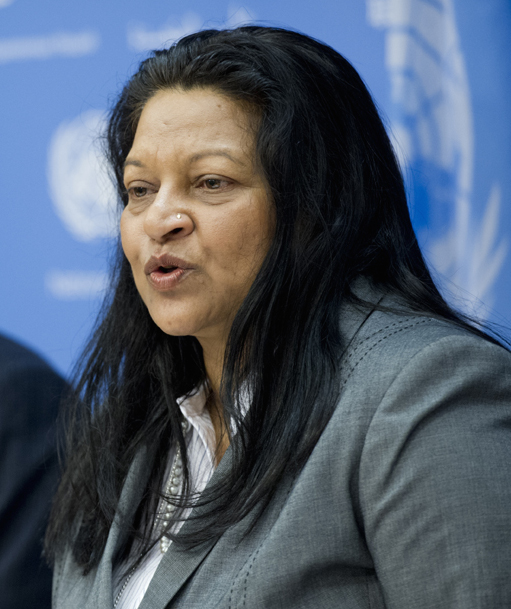
Human rights defender's story: Sheila Keetharuth, the former Special Rapporteur on the situation of human rights in Eritrea
Sheila Keetharuth, with her extensive background in human rights advocacy and as a Special Rapporteur on Eritrea, highlights the critical role of defenders in driving human rights change, emphasising the power of international mechanisms in providing visibility and protection.
I have been exposed to ISHR’s avant-garde work from the mid-90s, when I used to consult The Human Rights Monitor, free of charge, at the seat of my national human rights organisation. In that pre-Internet era, it was a precious document, giving an update about the outcome of deliberations at the Human Rights Commission in Geneva.
I have also had professional links with ISHR in my capacity as the Executive Director of the Institute for Human Rights and Development in Africa (IHRDA). We have worked jointly on projects, such as the publication of A Human Rights Defenders’ Guide to the African Commission which was launched in May 2012.
I also benefited from ISHR training in 2011, which gave me hands-on experience of working with the UN Human Rights Council.
What is the role of national level human rights defenders and civil society in driving human rights change?
Human rights defenders are the first in line in gauging the ‘human rights pulse’ at the national level. They are able to access information about human rights violations in a timely manner, acting as whistleblowers or giving early warnings. It is through their monitoring, documentation and advocacy that egregious human rights violations are brought to the attention of the world. Consequently, they can raise awareness and lobby for positive measures to be put in place to address the violations concerned. Human rights defenders at the national level, working in tandem with international non-governmental organisations, can give visibility to what is happening in a specific country, focusing on a single or range of issues.
However, in the context of Eritrea, human rights defenders cannot act openly from inside the country due to reprisals or the threat thereof. Eritrean defenders, as well as others working on Eritrean issues operate from outside. While not ideal, this helps to keep human rights in Eritrea high on the international agenda to bring about positive measures and change in the field of human rights.
What should human rights defenders know about working with international mechanisms, and with your mandate?
When human rights defenders interact with international mechanisms, be it at the global or the regional level, visibility can be given to their work. Such visibility can give protection to them by raising the profile of both the issue and of the human rights defender. However, one still needs to bear in mind the possibility of reprisals and act accordingly.
On a practical level, human rights defenders need knowledge about how they can work with the mechanisms, their procedures and any timing requirements involved. For example, as Special Rapporteur, I am required to report to the Human Rights Council in June and to the General Assembly’s Third Committee in October. So, I would need to obtain any information from defenders and NGOs by February to include it in my report. Having said that, information can be shared with the mandate at any moment in time.
Another important question human rights defenders ask is how to initiate and maintain contact with the mandate and different mechanisms. What defenders need to know is that this is very simple; an email would be sufficient. In the case of my mandate, I developed a questionnaire to assist with the gathering of information and presentation of the story.
What do you see as ISHR’s track record and role in the future?
ISHR’s track record is impressive already. I would encourage the organisation to continue its engagement with human rights defenders through its relevant training and cutting-edge work to support them.
